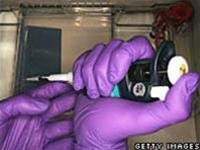European countries are accelerating measures to combat the spread of avian influenza, following the discovery of the H5N1 virus in Turkey and Romania. The EU Council has now banned poultry imports from these two countries.
 |
|
European countries are ramping up flu medication stockpiles |
Several European nations have begun stockpiling flu medications, while others are making significant efforts to prevent the outbreak from spreading. Scientists are concerned that if a person is infected with both the common flu and avian influenza simultaneously, the avian flu virus could mutate and become transmissible from human to human.
* In Romania
Health authorities in Romania, a candidate for EU membership, report that they have prepared thousands of doses of flu medication. More than 15,000 people in the Danube River basin, where the first cases of avian flu were detected, have been vaccinated against the flu. Thousands of infected birds have been culled in the virus-affected areas.
* In the UK
The UK government has stockpiled 14.6 million doses of Tamiflu. To date, this medication is still considered the most effective for treating avian influenza. Last July, thousands of chickens were also culled after an outbreak in Newcastle, although this outbreak was not related to avian influenza.
* In the Netherlands
The Dutch government recently decided to ban the outdoor release of birds and poultry. This ban was implemented following a report from Russian authorities indicating that avian influenza was spreading to Western Europe due to migratory birds. The Netherlands, one of the world’s largest meat exporters, had to cull about a quarter of its poultry two years ago due to an avian flu outbreak.
* In Bulgaria
Bulgaria, another EU candidate, has tightened border controls with its neighboring countries Turkey and Romania in an effort to prevent the spread of the flu outbreak. Bulgarian authorities report that no avian influenza virus has been found in dead migratory birds so far.
* In France
French ministers announced that since August, they have ordered around 200 million masks and a large supply of flu medication sufficient for the entire population of France. Health screenings at airports have also been intensified.
* In Germany
The country has also tightened controls at borders and airports to prevent the spread of H5N1 through illegal animal imports. Earlier this year, German ministers followed the Netherlands’ example by issuing a ban on letting poultry outdoors.
* In Russia
Russia culled over 100,000 birds last July after the avian influenza virus was detected in the Novosibirsk region of Siberia. A dead bird infected with H5N1 was also recently found in Siberia. This has raised fears that migratory birds could carry the virus from Southeast Asia and Russia to the Balkans and Europe.
H.HONG (according to BBC)


















































